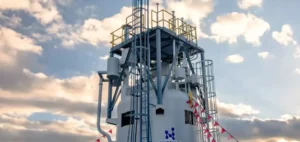Iraq’s nuclear industry is expanding. Iraq plans to build eight nuclear reactors by 2030 to overcome chronic electricity shortages. In this way, the country intends to reduce its energy dependence and meet 25% of its needs withnuclear power.
Iraqi nuclear power: citizens without electricity
Power outages are ubiquitous in Iraq. In fact, there is a 10GW gap between capacity and energy demand.
The country of 40 million inhabitants would theoretically need 28GW, but today only 22GW is produced or imported. Not to mention that in summer, with sweltering temperatures approaching 50°C, energy consumption peaks at 30GW.
11 GW of nuclear reactors
Iraq intends to meet energy demand by building nuclear reactors capable of generating up to 11GW, or 8,000MW/month. Closing this gap is a matter of urgency for this oil-rich economy, which is suffering from economic crises. Achieving energy autonomy would make Iraq more independent, particularly within OPEC.
A $40 billion project
Building eight nuclear reactors costs $40 billion. A cost far too high for Iraq to afford.
The Chairman of the Iraqi Nuclear Resources Authority, Kamal Latif, said that several states could take part in the project. These include Russia and South Korea, as well as France and the United States.
Iraqi nuclear: negotiations underway
Iraq is going through its worst economic crisis yet plans to negotiate twenty-year payment facilities. It seemed that South Korean officials wanted to participate in the construction of the plants. But Kepco, the Korean energy producer, denied any involvement.
Negotiations seem to be more advanced on the Russian side. Rosatom has issued a statement calling for cooperation for peaceful purposes:
“Rosatom is discussing an opportunity for cooperation in the field of nuclear energy with Iraqi partners”.
Already too late for a 2030 deadline
This large-scale project will add a further 11GW. This will still not be enough for 2030, when the energy requirement is expected to reach 42GW.
The fertility rate is close to four children per woman, heralding a marked increase in the population. The latter will therefore consume more. The gap between demand and energy capacity will reach 14GW even with the eight new reactors.
Iraq commits to infrastructure modernization
In the hope of exporting more oil, Iraq has tried to renovate its transmission infrastructure, whose circuits were in a state of disrepair. Iraq had come to an agreement with Germany and the United States, but the project never got off the ground.
The country still captures its natural gas with polluting flares. Losses are estimated at up to 50%, or $2.5 billion.
Chronic instability in Iraq
Severe economic crises, widespread power cuts and an unstable government don’t mix well. Iraqi nuclear power is as essential as it is necessary to prevent protests that have threatened to topple the government. Iraq sees nuclear power as a solution to guarantee cheaper electricity available every day.
Iraqi nuclear power: towards energy independence
Faced with shortages, “without nuclear power by 2030, we’ll be in big trouble”, assures Mr. Latif. Iraq’s nuclear power is a godsend for the country, which is trying to rid itself of its energy dependence on Iran. The latter imports 1.3MW/day.
The Iraqi government hopes to have found the solution to ensure uninterrupted electricity supply for its citizens. However, it is not certain that the 8 reactors will meet the growing demand.






















